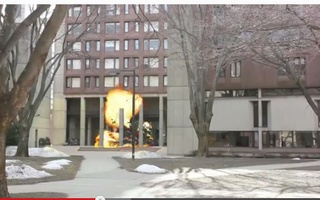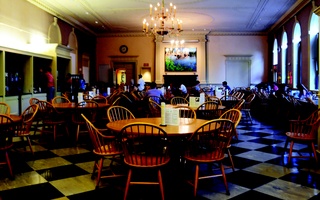We all know the story.
In the heart of Happy Valley lies Pennsylvania State University; renowned for its successful football program, Penn State was led by head coach Joe Paterno for almost half a century. In Happy Valley, Saturdays meant tailgates, barbeques, and, best of all, football. Life was good. But everything changed in November 2011 when assistant coach Jerry Sandusky was charged with and later convicted of child sex abuse. The events following this controversy led to the community’s descent into madness. The late Joe Paterno was met with accusations of covering up the scandal, and the football program was suspended for four years, with Paterno’s 111 wins since 1998 expunged from the school’s record. In a place where football was a way of life, this was a death sentence. The media coverage of this event was content with leaving everything as it was: a community with a stained reputation and the devil as its saint.
{shortcode-1918ec4decaf58f9ee6682b950bb4b43875c6801}
Yet even with Sandusky in jail and the scandal seemingly resolved, director Amir Bar-Lev let The Crimson know that he wants to revisit the scandal that took place almost three years ago. In his documentary “Happy Valley,” Bar-Lev wishes to set the record straight and show everyone that what we think we know of this story is only the beginning.
Bar-Lev seeks to create something that will leave people with a desire for self-improvement. He speaks of empathy for people who are unable to speak for themselves. Embedded in this film is a message that people like Paterno are more than what they are made out to be: neither devil nor saint. At the heart of every person are flaws that are often overlooked. “The other folks in this story, the people who created decisions about whether or not Jerry’s crimes were their problem, have, in my mind, more to teach us in our everyday lives,” Bar-Lev says. Rather than condemning Sandusky’s crimes, “Happy Valley” informs us about the shortcomings of human nature through its candid depiction of reactions to these events.
What starts out as an examination of Sandusky’s crimes evolves into something more: an intense psychological examination of the people inhabiting Happy Valley. Some refuse to believe anything that suggested Joe Paterno was less than perfect. Others even claimed Sandusky was innocent and that the outspoken victims were liars. “I think these people are making the point of the film: when you hold onto your identity and your heroes so tightly that you cannot allow for any sense that they are fallible human beings, then you are inviting the type of problems that we have seen in this story,” Bar-Lev says.
This was a community that was deceived, and after that realization, felt a foreign sense of vulnerability and crisis in the midst of the accusations. While it may seem that these problems are contained within Happy Valley, Bar-Lev suggests otherwise. “This is a story that is in many ways a parable about fatherhood. I think Joe Paterno was a symbolic surrogate father in this community who was going to protect the community from danger, from the outside world in the same way we feel about our fathers when we are young,” he says. Indeed, it takes a dramatic realignment in perspective to understand that our heroes are just like us: human in every sense of the word.
If there is any lesson to learn from these events, it is that true strength lies not in an individual but in community. “I’m kind of an old-fashioned collectivist type, and I believe the reality is that we as a group are the only ones who can act heroically, that there are no heroes or saints out there who can save us from evil people,” Bar-Lev says. During their darkest hour, Penn State and its surrounding community showed their true qualities, coming together to show the intensely curious and observant world outside Happy Valley that their time was not over.
As a reaction to the sensationalist media coverage of this event, Bar-Lev hopes to inform as well as put forward a new perspective. “The reason I’m in the business of documentaries is to paint the world in shades of gray, to paint complex pictures. These are important because they give us empathy,” Bar-Lev says. “Empathy is what the world needs most, and what I’m proud of in terms of this film is that people from widely disparate points of view are responding to the film and seeing their own points of view fairly and accurately.” In a world informed by the black-and-white morality of media coverage, “Happy Valley” challenges us with the moral gray area, with hard questions that do not necessarily have an answer. Did Paterno and Penn State deserve to be penalized for Sandusky’s crimes? According to Bar-Lev, that is up to us to decide.
{shortcode-53845c7265416e23e72e3ce7b2f0d11daf8b44d8}
Ambiguity is Bar-Lev’s trademark here, which led to internal contention as his own opinions changed drastically during filming. “For [the interviewee] Tyler, a die-hard Paterno supporter, I don’t agree with a lot of what he said, but I think he has some challenging opinions,” he says. “When you see a moment of silence for the victims of child abuse, which I believe is a good thing, you can see the lion mascot hanging his head down while his haunches are pouncing up and down ready to play football. You can see the kid Tyler’s point. There’s a kind of sanctimonious phoniness about the whole thing, which causes one to ask deep questions about football itself and spectacle.”
Bar-Lev’s personal experience taps into the entire essence of the film. It is not about morality or scandal. Rather, it is inherently a psychological exploration of a community during a time of crisis and, most importantly, an exercise in empathy for viewers and spectators.
—Contributing writer Richard Nguyen can be reached at rnguyen@college.harvard.edu.
Read more in Arts
One Direction Cements Image on 'Four'Recommended Articles
-
Leverett Athletes Run the GamutSome mornings, people come running out (sometimes already sweaty), and other mornings, hoards of varsity athletes in their sweatsuits head to the dining hall, either from a hellish practice or a long run. Funny thing is, most of them live in Leverett.
-
In Memoriam of the ’80s DanceThe Leverett House ’80s Dance entered this world 20 years after the themed dance’s namesake decade ended. Now, as the ...
-
 Housing Day is Pfunny and Feels Good
Housing Day is Pfunny and Feels Good -
 Leverett House
Leverett House -
 Housing Day Videos 2013: The Ultimate Roundup
Housing Day Videos 2013: The Ultimate Roundup -
 Bistro Lev
Bistro Lev













